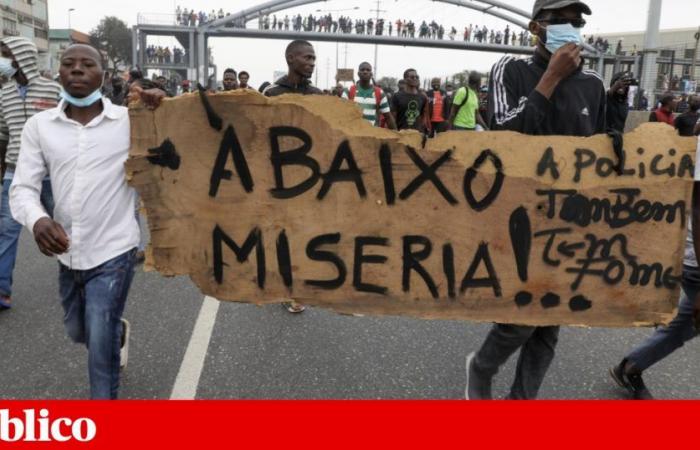Trade unionists were waiting for a gesture from the Government, an expression of willingness to return to the national consultation table and reach a consensus on increasing the Angolan minimum wage, which has been losing purchasing power at a galloping pace in the face of the devaluation of the kwanza and inflation. As President João Lourenço’s executive did not take this step, the unions will even move towards a three-day general strike starting this Wednesday.
“We reiterate the strike and explain, above all, to national and international public opinion the motivations that led us to go on strike, since the Government, during six rounds of negotiations, since last December, did not present plausible answers”, stated the union spokesman, Adriano Manuel, cited by Lusa.
The central Força Sindical, UNTA-Confederação Sindical and the Central Geral dos Trabalhadores-CGSSILA are trying to negotiate a list of demands with the Government that includes, in addition to the increase in the minimum wage, the updating of public service salaries and a reduction in taxes, but the situation reached an impasse with both parties far from reaching an agreement.
The current minimum wage in Angola is 32,181 kwanzas, which is equivalent to 35 euros, the unions took to the negotiating table an increase to 245 thousand kwanzas (268 euros), a value that the Minister of Public Administration, Labor and Social Security , Teresa Dias, already considered it “completely out of the ordinary”.
“To implement a national minimum wage of 250,000 kwanzas, everyone would have to be able to pay this amount, even for domestic workers”, added the government official, quoted by the New Newspaper.
To the unions’ proposal, the executive opposed three levels of increase in the minimum wage: 48 thousand kwanzas (53 euros) for small companies, 70 thousand kwanzas (77 euros) for medium-sized ones and 96 thousand kwanzas (105 euros) for big companies.
The country is immersed in a serious currency crisis, which means that today it takes almost 907 kwanzas to buy one euro. As most inputs are imported, the largest companies are postponing or canceling investments and possible new layoffs are looming. This in a country where the unemployment rate increased in the last quarter of 2023 to 31.9% and where only 10.5% of the population, according to the International Labor Organization, benefits from social security support.
With the International Monetary Fund (IMF) asking for more budgetary adjustment and greater sustainability of Angolan public debt (it rose to 84% in 2023 due to the devaluation of the kwanza), demanding the Government to give priority to structural reforms to reduce dependence on oil – The diversification of the Angolan economy is something that the MPLA governments have been promising since the financial bonhomie of the 2002 post-peace agreement, but that this Tuesday, economist Alves da Rocha, in a debate at the Catholic University of Angola , he said, quoted by Lusa, that “it is not happening” – the near future for Angolans does not look promising.
The latest annual analysis of the Angolan economy carried out by the IMF and presented last week in Luanda adjusted the growth of the Angolan economy in 2023 to just 0.5% (mainly due to the 6.1% drop in the oil sector), forecasting growth of 2.6% in 2024, but with strong risks of the forecast being revised downwards due to the volatility of the oil sector.
President João Lourenço returned this Tuesday from China, where he was on an official visit with the issue of paying Angola’s external debt at the top of the agenda, especially as the Chinese continue to be the country’s biggest creditors. According to the Business Journal, the Angolan President went to negotiate a moratorium on the payment of interest on the debt in order to alleviate some of the pressure on the depleted public coffers. Beijing reportedly offered 12 months, but Lourenço tried for a longer period, which taking into account the recent cooling of relations between the two countries and Angola’s rapprochement with the United States, may have given the Angolan head of state greater negotiating power.
It is in the midst of this difficult economic situation that unions are seeking to gain some purchasing power for public employees who have seen their purchasing power suffer continuous erosion since the current minimum wage came into force on February 1, 2022. At that time , it took 565 kwanzas to buy 1 euro. Since then, the Angolan currency has devalued by more than 50%.






